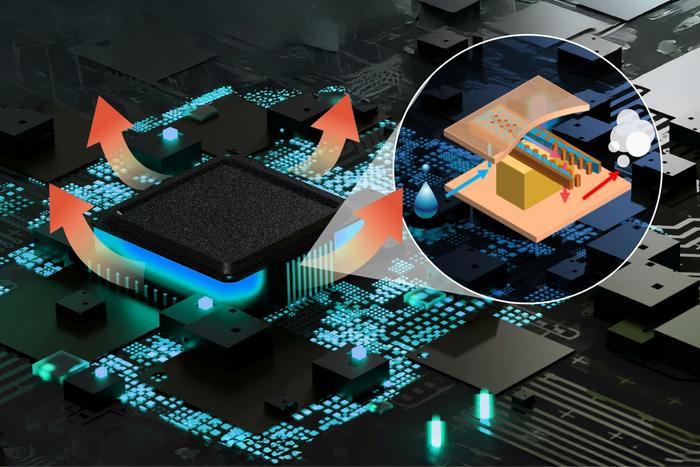In the fast-evolving realm of electronic technology, researchers have been scrambling to meet the demands imposed by Moore’s Law, which posits that the number of transistors on a microchip doubles approximately every two years, leading to significant increases in computing power. However, as electronic devices become increasingly miniature and performance specifications escalate, the issue of heat management emerges as a critical hurdle. High-power electronics are particularly challenged by inefficient thermal management systems that limit performance and potentially lead to device failure. This challenge has spurred research into more sophisticated cooling technologies, with groundbreaking findings emerging from the Institute of Industrial Science at The University of Tokyo.
A recent study published in Cell Reports Physical Science presents an innovative cooling solution that enhances the efficiency of electronic chip cooling using a novel system that incorporates manifold-capillary structures. This advanced two-phase cooling strategy leverages the latent heat of water for more effective thermal management, representing a dramatic departure from traditional cooling methods that primarily utilize sensible heat. The implications of this leap forward could reshape the landscape of high-performance electronics, catalyzing the development of next-generation devices.
Two-phase cooling systems work on the principle of phase change, where a liquid coolant, typically water, transitions to vapor and back again. This process takes advantage of the high thermal energy absorption that occurs during evaporation, thereby facilitating superior heat dissipation compared to conventional single-phase cooling. The previous methods suffered from significant limitations, primarily due to the management of vapor bubbles and optimal flow regulation post-heating. Researchers have long sought better geometries in cooling designs to alleviate these issues, leading to a focus on innovative microchannel designs as superior alternatives.
What’s particularly noteworthy about this new research is the implementation of three-dimensional microfluidic channel structures that allow water to flow through intricately designed capillaries within the chip. The study’s lead author, Hongyuan Shi, highlights that the geometry and distribution of these microchannels directly influence thermal efficiency and the system’s overall hydraulic performance. The efficient flow of coolant is enhanced through meticulous engineering of manifold structures that regulate coolant distribution, resulting in improved cooling output.
The researchers meticulously crafted various capillary patterns and examined their cooling attributes across different experimental conditions. A critical finding that emerged from this study was the exceptionally high coefficient of performance (COP), demonstrated to reach ratios of up to 100,000. This performance metric represents a significant innovation over existing cooling technologies, underscoring the potential of this newly engineered cooling system to revolutionize thermal management in high-power applications.
As electronic devices continue to demand higher power efficiency and reliability, the thermal management solutions emerging from this research are essential. Thermal mismanagement can lead to reduced device lifespan, compromised performance, and even catastrophic failure. Consequently, the world of electronics is poised for a significant shift as two-phase cooling techniques evolve into viable, mainstream solutions, ideally suited for everything from advanced computing systems to transformative consumer electronics.
Further, the importance of this cooling technology extends beyond mere performance enhancement. With the increasing emphasis on sustainability and carbon neutrality, efficient thermal management can play a pivotal role in reducing energy consumption and waste heat generation. By integrating advanced cooling methodologies into everyday electronic devices, manufacturers may significantly minimize energy waste, thus contributing to global sustainability efforts.
It is essential to recognize the research as being not just an academic exercise but a potential cornerstone for future industrial applications. The University of Tokyo’s Institute of Industrial Science boasts a reputation for bridging the gap between theoretical research and practical applications, and this ongoing inquiry into advanced cooling mechanisms is no exception. Its findings indicate promising advancements in microengineering and materials science that could redefine standards for the heat management of high-performance electronics.
As technology continues to push the boundaries of what is possible in energy-efficient electronics, the ramifications of this study highlight an exciting era for innovation. The implementation of capillary microfluidic systems across various electronic platforms could lead to smarter and more energy-efficient devices in the near future, indicating that the limitations once placed on chip performance may soon become a relic of the past.
Cross-disciplinary collaborations among engineers, physicists, and material scientists will be vital in propelling these advancements further. The work emerging from this research group sets a benchmark, encouraging worldwide research efforts aimed at enhancing device performance through better thermal management. As we look toward the horizon of next-generation technology, innovations like these promise to keep pace with the relentless evolution of our digital world.
In summary, the developments stemming from the research at The University of Tokyo not only spark hope for improved chip cooling technology but also shed light on a sustainable future for electronics. Researchers have unlocked a portal to advanced thermal management solutions that could herald a new age for the performance and longevity of high-power electronics as the digital landscape is reshaped by innovations that promise to enhance energy efficiency dramatically.
Subject of Research: Advanced thermal management technology for electronic devices.
Article Title: Chip cooling with manifold-capillary structures enables 105 COP in two-phase systems.
News Publication Date: 7-Apr-2025.
Web References: https://doi.org/10.1016/j.xcrp.2025.102520
References: None.
Image Credits: Institute of Industrial Science, The University of Tokyo.
Keywords
Physical sciences, fluid dynamics, microfluidics, electronics, thermal management, two-phase cooling, capillary structures, high-performance electronics, sustainability, energy efficiency, advanced engineering.




